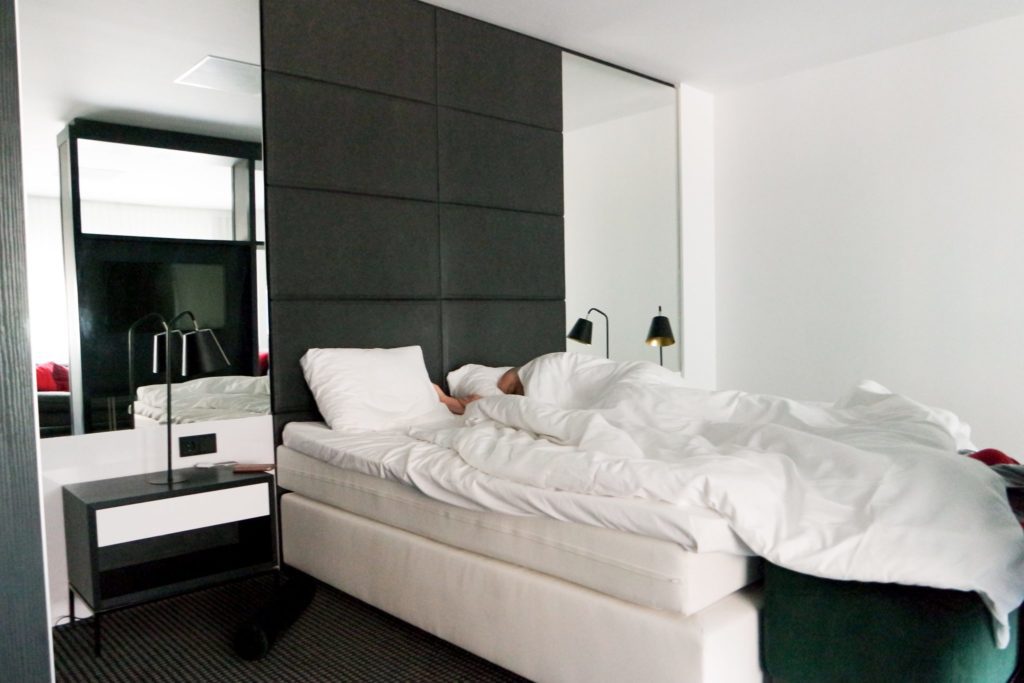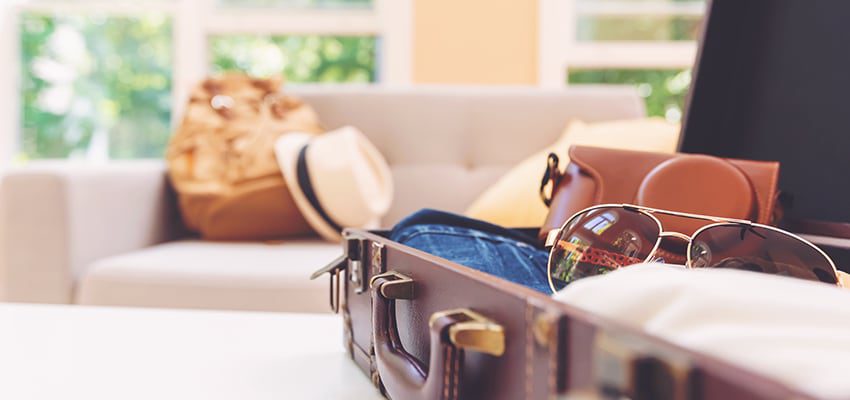Getting enough sleep at night is important for maintaining overall health and feeling energized each day, including during your travels. Getting sufficient sleep can be challenging while traveling because of changes to your usual routine and travel fatigue. Traveling longer distances can even disrupt the body’s internal clock and lead to jet lag.
When travel causes a lack of sleep, a person may experience sleep deprivation. By maintaining a healthy amount of sleep during travels, you can avoid unwanted effects of insufficient sleep such as lowered performance and poor focus at work or social events.
Knowing what jet lag is and other ways sleep can be affected by travel can help you prepare in advance. We also break down strategies for getting a good night’s sleep during your travels to and upon arrival at your travel destination.
How Can Travel Impact Sleep?
Although traveling may bring new, exciting experiences, it can also bring changes to your daytime routines, sleep environments, and sleep schedule, all of which can impact your sleep. An unfamiliar sleeping space may make it more difficult to fall asleep or stay asleep. Changes in when you sleep and wake up may also affect your ability to get enough sleep.
Additionally, traveling can also lead to disordered sleep and exhaustion. Flying across time zones may cause jet lag, and the busyness of travel itself may cause travel fatigue.
Jet Lag
Jet lag is a sleep disorder that occurs when a person’s internal clock does not align with the time of the destination they have traveled to. Often the temporary disorder is brought on by traveling across two or more time zones.
Symptoms of jet lag include:
- Difficulty falling asleep at the arrival location’s nighttime
- Drowsiness during the new daytime hours
- Decrease in the total amount of sleep
- Gastrointestinal issues
- Problems with memory or concentration
Jet lag symptoms decrease over time, usually lasting one to two days. The extent of a person’s symptoms and their recovery time depends on the number of time zones they travel across.
The direction of travel around the globe also affects the severity of jet lag symptoms. Traveling east, which involves waking earlier and going to sleep earlier, is typically more difficult than traveling west.
Travel Fatigue
Travel fatigue is the exhaustion brought on by the stresses of traveling itself. Unlike jet lag, travel fatigue can occur without crossing any time zones. Symptoms of travel fatigue include headache, confusion, and tiredness.
Causes of travel fatigue are associated with the constraints of travel, such as dehydration, restricted movement, and irregular sleep and meal schedules. Travel fatigue usually resolves after sufficient restful sleep and a normal diet.
How to Sleep Better When Traveling
There are no treatments that can instantly reset your internal clock, but there are strategies to adjust to a new local time faster. You can take steps ahead of traveling to help your body prepare for upcoming changes. Experts also recommend a combination of regulating light exposure and taking melatonin supplements to ease travel fatigue and jet lag symptoms.
Shift Your Sleep Schedule Before Traveling
Before traveling, adjust when you fall asleep one or two hours closer to the time for sleeping at your destination. This change gives your body a head start in preparing for your new local time and may decrease jet lag. When traveling east, go to bed sooner than normal. When traveling west, try to stay up a little later.
However, for trips shorter than three days, sticking to your usual sleep-wake schedule may actually be best for fending off jet lag.
Pack Essential Travel Accessories
A number of travel accessories can help improve your sleep quality while traveling. Eye masks can block out excess light that might otherwise keep you awake. Ear plugs may help reduce distracting noises during sleep.
If you have sleep apnea, remember to bring any treatments you use at night, such as your continuous positive airway pressure (CPAP) machine. You could consider a travel CPAP machine if you travel frequently.
Also consider packing other items that help you sleep more comfortably. Your favorite sleepwear and objects you regularly sleep with may help support better sleep while you travel.
Get Plenty of Light
Exposure to light is key to reducing the incidence of jet lag, daytime sleepiness, and insomnia during your travels. If it is not possible to access sunlight or bright indoor lights, a light box can help support wakefulness during the day and healthy sleep at night.
The best time to get light exposure depends on the destination you travel to. When traveling eastward, getting light at your destination in the mid- to late morning can help you adjust to the local schedule. For westward travel, light in the late afternoon or the early evening may be helpful.
You may also consider getting sunlight exposure as you would at your destination for a few days in advance of your travels.

Try Melatonin
Melatonin supplements are believed to support the body’s natural processes for falling asleep. Experts recommend that travelers consider taking melatonin supplements in addition to getting light exposure to ease jet lag.
The supplement can be beneficial when the destination is multiple time zones to the east. When traveling eastward, taking melatonin around the destination’s dusk time for up to five days after arrival can aid in transitioning to the local time.
Short westward travel might not require melatonin. Instead, timing exposure to light may be sufficient.
Use Caffeine and Naps Strategically
Caffeine promotes alertness and may help you wake up at your destination’s morning time. Limit your caffeine intake during your new afternoon and evening hours. Because the effects of caffeine can last up to eight hours, consuming caffeine too late in the day can make it difficult to sleep.
Napping may help limit drowsiness caused by insufficient sleep during traveling. Research suggests that 20-minute naps can help you catch up on lost sleep during travel. However, longer naps might make it more difficult to sleep during your destination’s nighttime. Limit naps to 30 minutes a minimum of eight hours before you go to sleep.
Maintain Your Bedtime Routine
Traveling requires sleeping away from your regular sleep environment. To adjust to the new sleeping space, follow your usual bedtime routine that helps you wind down each night. Taking a bath, listening to music, or reading can be part of your relaxing evening habits. Keeping to your nighttime routines can help decrease the symptoms of jet lag.
How to Avoid Fatigue While in Transit
Whether you travel by car, plane, bus, boat, or train, you probably want to feel awake and alert when you arrive at your final destination. There are several steps you can take to avoid fatigue and reduce the severity of jet lag.
- Move Your Body: Make time during your journey to get up from your seat and move around. A lack of activity is one way that planes and other forms of travel can increase fatigue.
- Avoid Alcohol and Caffeine Before Arrival: Alcohol and caffeine can contribute to fatigue during your travels. Avoid both to reduce risk of jet lag.
- Drink Plenty of Water: Increase your water while in transit. Dehydration can lead to travel fatigue and increase the time it takes to recover from jet lag.
- Sleep if it’s Nighttime at Your Destination: You can get yourself on schedule with your destination time as you travel by taking the opportunity to sleep. A neck pillow, eye mask, or ear plugs might help you sleep more comfortably.
References
Ask the Sleep Doctor
Have questions about sleep? Submit them here! We use your questions to help us decide topics for future articles, videos, and newsletters. We try to answer as many questions as possible. You can also send us an email. Please note, we cannot provide specific medical advice, and always recommend you contact your doctor for any medical matters.







